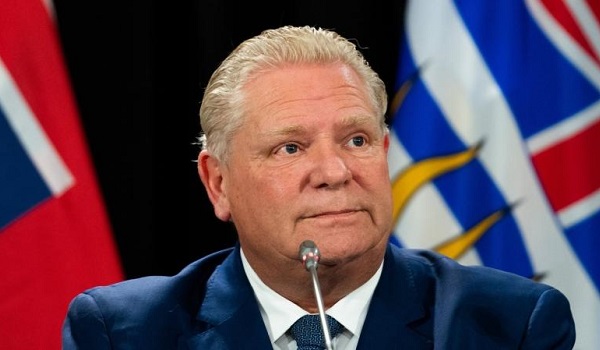Ontario provincial budget to be unveiled Tuesday amid growing economic uncertainty
The Ontario government is set to unveil a provincial budget on Tuesday that Premier Doug Ford says will be balanced in its approach to key priorities, such as infrastructure and housing – but the document is not actually expected to eliminate deficit spending in the coming fiscal year, as the province faces growing economic uncertainty.
Mr. Ford said the upcoming 2024 financial blueprint would take a balanced approach and include new spending and help for Ontario’s 444 municipal governments as they seek to meet the province’s targets for new-home construction.
“It’s going to be a very balanced budget, per se,” he said. “We’re going to focus always on supporting the 444 communities through infrastructure.”
Ontario Finance Minister Peter Bethlenfalvy and Mr. Ford already announced a major plank of their new spending plan last week: an additional $1.8-billion for infrastructure, including $1-billion for a new municipal housing infrastructure program and $625-million more for a water systems fund. The measures were aimed at addressing complaints from municipalities that their ability to build new housing is hampered by a lack of resources for roads and pipes.
There is no question that the worsening economy is complicating matters for the province, which has in recent years benefited from the unanticipated added tax revenues that came with the rebound after pandemic restrictions were lifted, which has since turned into a slump amid inflation the higher interest rates meant to snuff out.
In last year’s budget, Ontario predicted it would balance its books by next year, in 2024-2025. But the province pushed that back to 2025-2026 in its economic statement last fall, projecting a $5.3-billion deficit next year instead of a modest surplus. For the 2023-2024 fiscal year that ends March 31, the government said in February it expected a $4.5-billion deficit, up from its projection a year ago of $1.3-billion.
Laryssa Waler, Mr. Ford’s former executive director of communications, who is now a principal at the public relations and lobbying firm GT and Company, said she expects this budget to be more of an update on the current state of the province’s finances and spending promises as opposed to a major rethink of policies.
“If the deficit goes up, if the path to balance is extended, it’s not, I think, a reflection on poor fiscal management. I think it’s responding to probably global and national influences that the province has to absorb,” she said in an interview.
“The big thing is they’re going to continue building, because they have to.”
Other provinces have unveiled budgets in recent weeks that reflect the effects of a weaker economy. Alberta’s United Conservative Party government predicts a $367-million surplus in 2024-2025, which is much smaller than the black ink of the last three years, and it is projecting a decline in tax revenues.
B.C.’s NDP government has forecast a record $7.9-billion deficit for 2024-2025 as it faces an election this fall. Quebec’s Coalition Avenir Québec government opted to ramp up spending and project a record $11-billion deficit in 2024-2025, scrapping plans to stop the red ink by 2027-2028 and offering no hope of balancing its books until at least 2029-2030.
Brian Lewis, a senior fellow with the University of Toronto’s Munk School of Global Affairs and Public Policy and Ontario’s former chief economist, say the souring economy is reducing the province’s fiscal wiggle room.
In a report for the Ontario360 think tank, he says key economic indicators now show the province is clearly worse off than it was in the last quarter of 2019, before the global pandemic. Unemployment is at 6.5 per cent, up almost a full percentage point, for example, and economic growth has slowed to a trickle. Plus the court ruling nullifying Ontario’s 2019 wage-hike-cap legislation for public-sector workers, known as Bill 124, will require billions of dollars for increases and backpay in the coming years.
He expects the province’s plans for a balanced budget will be pushed further ahead – past the next election in 2026.
“My instincts are that what we will see is likely a longer return to balance,” he said in an interview.
In a budget submission to the government, the Ontario Chamber of Commerce called for measures to improve the province’s long-stalled productivity, such as by using tax policy, capital market reforms and loan guarantees to improve access to private capital and credit for small businesses. The chamber also called for more funding for health care.
On the housing crisis, which the OCC says is hurting the province’s ability to attract business investment, among its recommendations is a call for zoning changes that would allow more “gentle density” – something the Premier vehemently rejected last week when he ruled out requiring municipalities to allow fourplexes without special zoning permission.
The OCC also called for more funding for the province’s struggling postsecondary institutions, both from the government and from allowing tuition to rise, so that Ontario can continue to benefit from its pool of skilled graduates.
“We pride ourselves on a highly skilled and diverse work force but we need to make sure we are fostering that on a go-forward basis,” said Daniel Safayeni, the OCC’s vice-president of policy.
The Ontario Medical Association has also called on the government to fix what it says is a crisis in primary care, by expanding team-based care and increasing spending. The association says 2.3 million people in the province do not have a family physician, a number that could rise to 4.4 million by 2026.
Ontario Opposition NDP Leader Marit Stiles said her party is looking for a budget that tackles the issues of health care, housing and the rising cost of living. The NDP is calling for more money for publicly funded health care, including for mental-health supports and the recruiting and retaining of health care workers, as well as funding for affordable, non-market and supportive housing.
“The Conservatives have proven time and again that they will always put the interests of their friends and insiders first. It’s time to change that, and they can start with a budget that puts people first,” Ms. Stiles said in a statement.
The Ontario Liberals also said the provincial Tories should come up with a retention plan for health care workers, add another $1.2-billion over three years for the postsecondary sector and return the provincial portion of the HST related to home heating.
This article was first reported by The Globe and Mail













